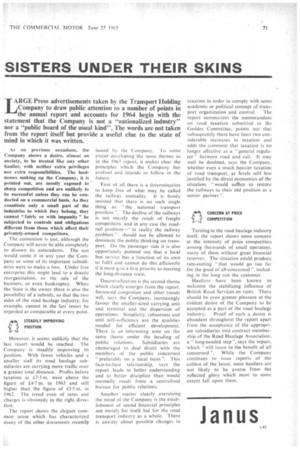SISTERS UNDER THEIR SKINS
Page 73

If you've noticed an error in this article please click here to report it so we can fix it.
LARGE Press advertisements taken by the Transport Holding Company to draw public attention to a number of points in the annual report and accounts for 1964 begin with the statement that the Company is not a "nationalized industry" nor a "public board of the usual kind". The words are not taken from the report itself but provide a useful clue to the state of mind in which it was written.
As on previous occasions, the Company shows a desire, almost an anxiety, to be treated like axiy other haulier, with neither extra privileges nor extra responsibilities. The businesses making up the Company, it is pointed out, are mostly exposed to sharp competition and are unlikely to be successful unless they can be conducted on a commercial basis. As they constitute only a small part of the industries to which they belong, they cannot "fairly or with impunity" be subjected to controls and obligations different from those which affect their privately-owned competitors.
The contention is just, although the Company will never be able completely to disown its antecedents. The test would come if in any year the Company or some of its important subsidiaries were to make a loss. Under free enterprise this might lead to a drastic reorganization, or the sale of the business, or even bankruptcy. When the State is the owner there is also the possibility of a subsidy, so that the two sides of the road haulage industry, for example, cannot in the last resort be regarded as comparable at every point.
STEADILY IMPROVING fael POSITION
However, it seems unlikely that the last resort would be reached. The Company is steadily improving its position. With fewer vehicles and a smaller stall its road haulage subsidiaries are carrying more traffic over a greater total distance. Profits before taxation at 0.3 m. were above the figure of L4-7 m. in 1963 and still higher than the figure of £3.5 m. in 1962. The trend even of rates and charges is obviously in the right direction.
The report shows the elegant common sense which has characterized many or the other documents recently
issued by the Company. To some extent developing the same themes as in the 1963 report, it makes clear the principles which the Company has evolved and intends to follow in the future.
First of all there is a• determination to keep. free of what may be called the railway mentality. It is firmly insisted that there is no such single thing as " the national transport problem". The decline of the railways is not merely the reSult of freight competition, and in any_case the roadrail problem—" in reality the railway
problem should not be allowed to dominate the public thinking on transport. On the passenger side it is also opportunely pointed out that a local bus service has a function of its own to fullil and cannot do this _efficiently if it must give a first priority to meeting the long-distance train.
Decentralization is the second theme which clearly emerges from the report. Increased congestion and other trends will, says the Company, increasingly favour the smaller-sized carrying unit and terminal and the dispersion of operations. Simplicity, robustness and unit self-sufficiency are the qualities needed for efficient development. There is an interesting note on the same theme under the heading of public relations. Subsidiaries are encouraged to deal direct with the members of the public concerned "preferably on a local basis ". This face-to-face relationship, says the report. leads to better understanding and to better discipline than would normally result from a centralized bureau for public relations.
Another matter clearly exercising the mind of the Company is the establishment of sound financial principles not merely for itself but for the road transport industry as a whole. There is anxiety about possible changes in
taxation in order to comply with some academic or political concept of transport organization and control. The report summarizes the memorandum on road taxation submitted to the Geddes Committee, points out that subsequently there have been two considerable increases in taxation and adds the comment that taxation is no longer effective as a "general regulator between road and rail. It may well be doubted, says the Company, whether even a much heavier taxation of road transport, at revels still less justified by the direct economics of the situation, "would suffice to restore the railways to their old position as a senior partner".
CONCERN AT PRICE COMPETITION Turning to the road haulage industry itself, the report shows some concern at the intensity of price competition among thousands of small operators. many of them without great financial reserves. The situation could produce rate-cutting that would go too far for the good of all-concerned ", including in the long run the customer.
Hauliers have been known to welcome the stabilizing influence of 13ritish Road Services on rates. There should be even greater pleasure at the evident desire of the Company to be accepted as a part of the road haulage industry. Proof of such a desire is abundant throughout the report apart from the acceptance of the appropriate subsidiaries into contract membership of the Road Haulage Association, a long-needed step ", says the report, which " will inure to the benefit of all concerned ". While the Company continues to issue reports of the calibre of the latest, most hauliers are not likely to be averse from the reflected glory which must to some extent fall upon them.
Janus




























































































































